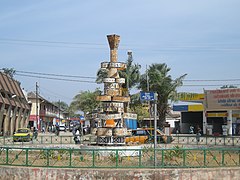Ziguinchor
| Ziguinchor | ||
|---|---|---|
| Commune | ||

Place Jean-Paul II in the Escale neighborhood of Ziguinchor
|
||
|
||
| Location within Senegal | ||
| Coordinates (region:SN_type:city): 12°33′43″N 16°17′2″W / 12.56194°N 16.28389°W | ||
| Country |
|
|
| Region | Ziguinchor Region | |
| Departement | Ziguinchor | |
| Government | ||
| • Mayor | Abdoulaye Baldé | |
| Area | ||
| • Commune | 9 km2 (3 sq mi) | |
| Elevation | 12 m (39 ft) | |
| Population (2013 census) | ||
| • Commune | 205,294 | |
| • Density | 23,000/km2 (59,000/sq mi) | |
| • Metro | 248,265 | |
| Time zone | GMT (UTC+0) | |
Ziguinchor (also called Zinguinchor) is the capital of the Ziguinchor Region, and the chief town of the Casamance area of Senegal, lying at the mouth of the Casamance River. It has a population of over 230,000 (2007 estimate). It is the second largest city of Senegal, but largely separated from the north of the country by The Gambia.
The city has a tropical savanna climate, with an average annual accumulated rainfall of 1547mm (about 61 inches).
The first European settlement in the area was founded by the Portuguese in 1645. According to tradition, Ziguinchor's name and meaning comes from the time when Portuguese traders and explorers came to the region to form a trading post, and derives from Portuguese Cheguei e choram, "I came and they cry". The local people, seeing the Europeans, began crying, thinking they were to be enslaved. The Portuguese objective was to form a trading post and a friendship alliance with the local king. Ziguinchor became in fact a slave port during much of the Portuguese occupation.
The spot was not chosen at random. While a Jola village predated the town, it was situated to trade with the Jola kingdom of Kasso, which dates back to the Mali Empire, when Mandinke people moved into the area from the south and east.
Following the end of the slave trade, Portuguese commerce stultified, and the town was eventually handed over to France on 22 April 1888, in a deal brokered amongst the colonial powers at the Berlin conference of 1886.
Under the French, Ziguinchor became a major trade port, mostly due to the intensive groundnut cultivation the colonial government encouraged in the interior. By 1900, the area was largely converted to Christianity, although significant Syncretist and Muslim communities flourish.
...
Wikipedia


